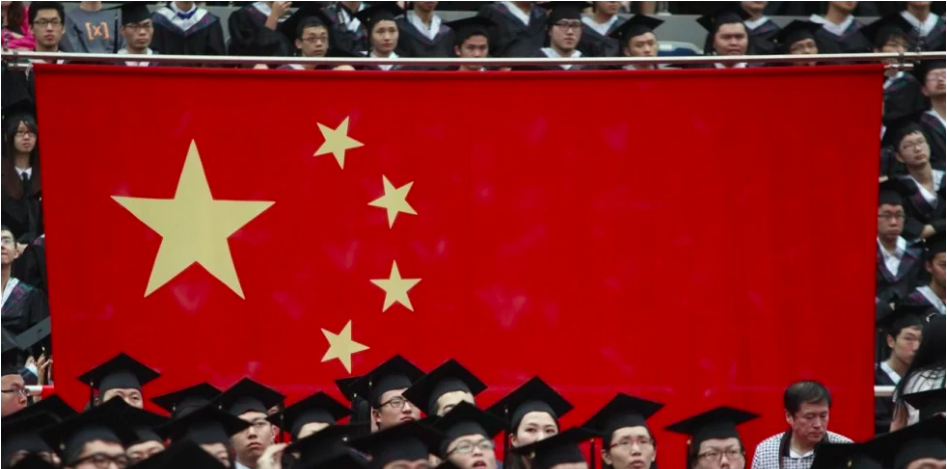The Chinese Communist Party has launched a new campaign aimed at “enhancing patriotism” among the country’s intellectuals. Academics are urged to toe the party line in the latest move to further tighten ideological control in universities, following earlier calls for greater “ideological guidance” and the study of Marxism for teachers and students. From Liu Caiyu at Global Times:
Chinese authorities are requiring intellectuals to participate in patriotism-themed activities and training to achieve the Chinese dream of national rejuvenation.
The campaign will be “launched mainly among young and middle-aged intellectuals at schools, research institutes, enterprises and public institutes,” according to a notice released by the Communist Party of China (CPC) Central Committee’s Organization Department and the Publicity Department, the Xinhua News Agency reported on Wednesday.
[…] The notice says intellectuals should strengthen their political consciousness, thereby improving their sense of identity with the Party and the country.
[…] To ensure the campaign’s success, authorities will ask intellectuals to integrate patriotism education with their personal work through seminars, training and daily studies. [Source]
Some see the campaign as a response to a rising tide of discontent from Chinese intellectuals, who have mounted growing pushback against President Xi Jinping’s policies and openly questioned the direction the country is headed in. Charlotte Gao at The Diplomat reports:
[…T]he Global Times, one of China’s most pro-government state-run newspapers, explained the CCP’s likely logic by quoting Su Wei, a professor at the Party School of the CCP Chongqing Municipal Committee. Su told the Global Times that “China’s patriotism education has faded in recent years, which has led to many abnormal phenomena.”
Amid U.S.-China trade tensions, rather than supporting their country, many Chinese intellectuals turned against their country on social media, Su added. Some intellectuals even express unrealistic dissatisfaction toward the country.
[…] One of the most remarkable examples is Xu Zhangrun, a law professor at Tsinghua University, one of China’s most prominent universities. Xu recently published online an extremely rare and harsh criticism against the top authority’s recent policies. In his article, Xu even touched upon the most sensitive political topic in today’s China — Xi Jinping’s decision to scrap the two-term limit for the presidency in China’s constitution.
In China, it goes without saying that such criticism by an intellectual is highly likely to bring about unimaginable retribution from the government. That’s why Jiang Hao, a researcher at Unirule Institute of Economics, an independent think tank in Beijing, told The New York Times that “Many intellectuals might be thinking the same [as Xu], but they don’t dare speak out.” [Source]
Others, however, see the campaign as part of a long-term initiative to instill a different kind of patriotism, one that centres on bringing the ideological identification of intellectuals in line with Party goals. Nectar Gan at SCMP reports:
[…] Steve Tsang, director of the SOAS China Institute, said the campaign would have been a long time in the planning, and it was unlikely to have been prompted by a single essay, however “cogent and sensitive” it was.
He added that “patriotism” was not being used by Beijing in the normal sense of the term.
“No reasonable and impartial person who has read Xu’s piece would have seen him as anything less than patriotic,” Tsang said.
But according to the campaign definition, Xu’s is the wrong type of patriotism.
“It is about indoctrinating academics, teachers and ‘intellectuals’ to ensure they all support the party as led by Xi Jinping under the banner of promoting patriotism. The party document makes this clear. No one will be considered patriotic or loving China or acting in the interest of China unless [they] support the party line as laid down by President Xi,” he said. [Source]
The current academic backlash is embedded within broader social changes occurring in Chinese society as the country undergoes further transformation. From Gordon Watts at Asia Times:
“China is extraordinarily fragmented, with a billion different individualized networks created by social media, and a middle class focused relentlessly on what works for them,” Kerry Brown, a professor of Chinese Studies and a director of the Lau China Institute at King’s College in London, said in an opinion piece for Inside Story.
“It’s not that they are brainwashed and made docile by party messages – it’s that they have in many ways moved beyond believing anything larger about the society around them. They buy into a strong, powerful China because it means security and wealth. They like the status this gives,” he continued on the media website founded by the Swinburne University of Technology in Australia.
“But Chinese society is moving into an era in which, as those material benefits become increasingly widespread, issues of meaning and value will come to the fore and demand something more than simple economic solutions,” Brown, whose new book, China’s Dreams: The Culture of the Communist Party of China and Its Secret Sources of Power, will be published next month, added. [Source]







